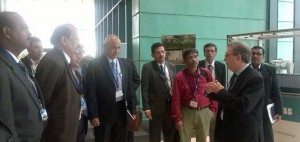14th December 2015 Bangalore, India
A whirlwind tour to UK’s manufacturing research centres
Unlike other visits to the UK, this one was different. I and my colleague Vijay Jasuja from UK Trade and Investment (UKTI) went on a tour to the UK with an interesting and vibrant mix of academics and R&D Heads of Indian manufacturing companies to visit the high value manufacturing catapults and universities from October 4 to 8 2015.
 The delegation comprised the following; Prakash Vinod, CMTI, Prof. K P Karunakaran, IIT-Mumbai, M R Saraf, ARAI, Dr. Piyush Pal Roy, CMERI, Subash Ramdoss, Elgi Equipments Limited, H.K.N. Swamy and Dr. Rajkumar P Singh, Bharat Forge Limited, Soundhar Rajhan, Lakshmi Machine Works, Ravi Damodaran, Varroc Group, Dr. Biswajit Basu and Dr Aspi Patel, Aditya Birla Group, Aravind Bharadwaj, Mahindra & Mahindra Ltd and John Richmond, Tata Group.
The delegation comprised the following; Prakash Vinod, CMTI, Prof. K P Karunakaran, IIT-Mumbai, M R Saraf, ARAI, Dr. Piyush Pal Roy, CMERI, Subash Ramdoss, Elgi Equipments Limited, H.K.N. Swamy and Dr. Rajkumar P Singh, Bharat Forge Limited, Soundhar Rajhan, Lakshmi Machine Works, Ravi Damodaran, Varroc Group, Dr. Biswajit Basu and Dr Aspi Patel, Aditya Birla Group, Aravind Bharadwaj, Mahindra & Mahindra Ltd and John Richmond, Tata Group.
Our first stop was at the Warwick Manufacturing Group which is at the forefront of developing innovative solutions in the automotive sector, manufacturing, and materials along with global companies. We also got a tour of the Energy Innovation Centre where we got a glimpse of the batteries pilot production line, the International Institute for Nanocomposites Manufacturing where nanomaterials are incorporated into different matrices and subsequently processed to produce multifunctional components for application in a range of industries, such as telecommunications, electronics, pharmaceuticals, aerospace, automotive, security and medicine. We also got a glimpse of the plans for the £100 million National Automotive Innovation Centre (NAIC) which when completed will house close to 1000 researchers and will work closely with industries on low carbon mobility.
The second stop was at Coventry where we visited the Manufacturing Technology Centre which houses some of the most advanced manufacturing facilities and is helping change the future of manufacturing technologies and processes. We saw additive manufacturing machines, hybrid machines, etc. in action making parts that would be very difficult and expensive to make using conventional manufacturing processes. Our guide was the enthusiastic Prof. David Wimpenny (who visited India a couple of months back see blog), who did a tour of the facilities and arranged for a panel discussion with experts so that all the queries of the delegates could be properly addressed.
We then travelled to Sheffield which has a reputation of metallurgy and steel making. The delegates visited the Advanced Manufacturing Research Centre which has world class machining expertise and does extensive materials research. It has a state of the art machining facility AMRC is also currently building a new landmark facility called AMRC Factory 2050. AMRC Factory 2050 will combine technologies including advanced robotics, flexible automation, unmanned workspace, off-line programming in virtual environments linked to plug-and-play robotics, 3D printing from flexible automated systems, man-machine interfaces, and new programming and training tools.
Three of us (Biswajit Basu, Aspi Patel and myself) skipped Sheffield and instead travelled to University of Leeds to meet up with Prof. Chris Carr who heads one of the largest school of textile design in the UK. Some of Chris Carr’s research interests are on how to modify fibrous materials so that their performance and surface chemistry are improved, healthcare textiles/materials, easy care finishing of cotton and wool, paper technology and novel colouration effects. We also met with Prof. Animesh Jha who works extensively on materials, processing of minerals, etc. This found resonance with the research and development work done at the Aditya Birla R&D Centre.
The next stop was at University of Cambridge where we visited the Institute for Manufacturing which is a renowned interdisciplinary institute dedicated to advanced manufacturing. Apart from understanding the range of work at the centre such as distributed manufacturing, nano manufacturing, etc Dr. Mukesh Kumar also undertook a mapping exercise of what areas UK and India could partner. This exercise threw up some interesting areas that I plan to work for UK-India projects in the next year.
The last stop was at the Manufacturing Informatics Centre, University of Cranfield where Prof. Ashutosh Tiwari and his team showed us what low cost gaming technology or sensors can do for manufacturing and servicing of automobiles. The technology can be used to capture and re-use human knowledge of complex manufacturing processes, which is a boon in an era where skill attrition is high and training costs are going up.
As a follow-up to the visit we hosted two exciting advanced engineering and innovation showcase events in India on December 1 in Pune and 3 in Bangalore along with colleagues from UK Trade and Investment (UKTI), which will be shared soon.